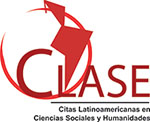ÍNDICES
Envíos
Lista de comprobación para la preparación de envíos
Como parte del proceso de envío, los autores/as están obligados a comprobar que su envío cumpla todos los elementos que se muestran a continuación. Se devolverán a los autores/as aquellos envíos que no cumplan estas directrices.Health Sciences
Publishes scientific papers related to some (s) of the following subjects: medicine, nursing, health technology, clinical psychology, nutrition sciences, pharmacy, veterinary medicine and dentistry.
Social and Political Sciences
Publishes scientific papers related to some (s) of the following subjects: history, philosophy, sociology, psychology, anthropology, demography, urbanism, legal sciences, library science, ethnography, ethnology, criminology, political science, archeology, geography and theology.
Education Science
Publishes scientific papers related to some (s) of the following subjects: pedagogy, didactics, philosophy of education, educational psychology, history of education, education economics, anthropology of education, comparative education, educational policy, management education, curriculum and teaching and learning of foreign languages.
Communication Sciences
Publishes scientific articles related to some) of the following subjects: journalism, social communication, organizational communication, advertising and public relations.
Ciencias técnicas y aplicadas
Publishes scientific papers related to some (s) of the following areas: engineering, nanotechnology, surveying, agronomy, agriculture, astronautics, biotechnology, electronics, industry, metallurgy, mining, farming, fishing, food and transport.
Natural Sciences
Publishes scientific papers related to some (s) of the following subjects: astronomy, physics, geology, chemistry and biology; as well as the disciplines derived from crosses between these: astrophysics, geophysics, physical chemistry, biophysics, biochemistry, geochemistry, and astrobiology Astrochemistry. It also includes environmental science, oceanography and marine biology.
Arts and Humanities
Publishes scientific papers related to some (s) of the following topics: architecture, sculpture, visual arts, music, performing arts, film, photography, cartoon, art history, cognitive science and philology.
Economics and Business
Publishes scientific papers related to some (s) of the following subjects: economics, accounting, tourism, trade, marketing and sales, human resources, social and safety, business law, economics, tax systems, financial mathematics, informatics business, mathematics and statistics applied to business management, organization and business administration.
Mathematical Sciences
Publishes scientific articles related to some) of the following subjects: arithmetic, algebra, geometry, calculus, logic, mathematical analysis and set theory.
Computer Sciences
Publishes scientific papers related to some (s) of the following subjects: computer science, theory of computation, algorithms and data structures, methods and programming languages, computer architecture, software engineering, artificial intelligence, computer networks and telecommunications systems, databases and operating systems.
Ciencias del deporte
Publica artículos científicos sobre temas relacionados con la actividad y salud físicas, el deporte, la recreación y el bienestar humano en sentido general.
Book Reviews
Aviso de derechos de autor/a
Authors retain copyright and guarantee the Journal the right to be the first publication of the work. These are covered by a Creative Commons (CC BY-NC-ND 4.0) license that allows others to share the work with an acknowledgment of the work authorship and the initial publication in this journal.
Declaración de privacidad
Los nombres y las direcciones de correo electrónico introducidos en esta revista se usarán exclusivamente para los fines establecidos en ella y no se proporcionarán a terceros o para su uso con otros fines.






